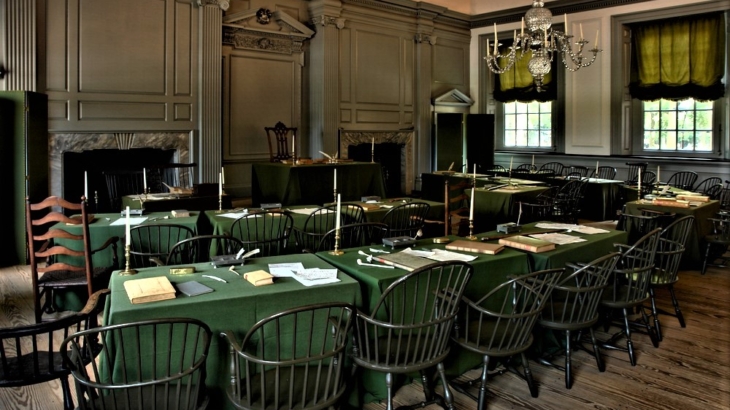Principle of Free Thought and Speech, a Core Component of a Self-Governing People
“The freedom of speech is a principal Pillar in a free Government: when this support is taken away the Constitution is dissolved, and Tyranny is erected on its Ruins.” – Pennsylvania Gazette, November 17, 1737, printed by Benjamin Franklin, later reprinted in the Barbados Gazette, 1738, and attributed to Pennsylvania Lawyer and Pennsylvania Colonial Representative as having possibly been the author of the article.
The Declaration of Independence asserts the self-evident truth that all human beings are created equal and endowed with natural rights. The Declaration then states that governments are established with the purpose of protecting those rights with the consent of the governed. This Lockean conception of social compact theory supported a representative government in the American republic.
The concept of consensual government naturally supported the idea of freedom of speech. While the nature of free speech differed from America’s modern conception, the principle of political free speech was fundamental to a republican form of government and self-governing society. Expressing political opinions in speech and in print, engaging in hearty debate and deliberation, and giving consent to representatives in legislatures were all essential for self-governance.
In The Federalist No. 51, James Madison wrote, “In republican government, the legislative authority necessarily predominates.” As the first branch of government, Congress most embodied the principle of self-government and representation. The legislative branch, both in Congress and the state legislatures, was the center of deliberation, debate, and consensus.
Indeed, the American founding experienced great deliberative moments that represented profound moments of reflection and discussion. These debates demonstrate the importance of free speech to exchange political viewpoints in a free society. In each case, they show that free debate of clashing viewpoints can result in the common good. For example, the members of the Second Continental Congress were unsure or even opposed to independence in early 1776. A vigorous debate occurred in which both sides of the issue sought to persuade the other. Eventually, the Congress unanimously agreed to independence.
During 1787-1788, the great deliberative moment of making and ratifying the United States Constitution witnessed robust debates between the Federalists and Anti-federalists over the principles of human nature and government. The debates took place in the secret Philadelphia convention, but the vigorous conversation moved into state ratifying conventions, newspapers and pamphlets, private letters, and taverns.
In the early republic, the George Washington presidential administration had its share of highly partisan and contentious debates. The debates over Secretary of the Treasury Alexander Hamilton’s financial plans and the crafting of American foreign policy were rooted in constitutionalism and establishing the right precedents for the new government as prescribed in the new Constitution. These deliberations could be offensive and personal, but they were also deeply rooted in constitutionalism as both sides took the document seriously.
In all of these debates, the key principle was the element of free speech. The representatives and the people freely asserted their views about the best ways to achieve good government. They may have often had rival conceptions of the public good, but they built consensus through sharing and debating those ideas, listening to the arguments of the other side, and trying to persuade others of a reasonable viewpoint. For these reasons, holding to the first principle of free speech and thought has always been a core component of a self-governing people.
 Tony Williams is a Senior Fellow at the Bill of Rights Institute and is the author of six books including Washington and Hamilton: The Alliance that Forged America, with Stephen Knott. Williams is currently writing a book on the Declaration of Independence.
Tony Williams is a Senior Fellow at the Bill of Rights Institute and is the author of six books including Washington and Hamilton: The Alliance that Forged America, with Stephen Knott. Williams is currently writing a book on the Declaration of Independence.
Click here for First Principles of the American Founding 90-Day Study Schedule.
Click here to receive our Daily 90-Day Study Essay emailed directly to your inbox.




Join the discussion! Post your comments below.
Your feedback and insights are welcome.Feel free to contribute!